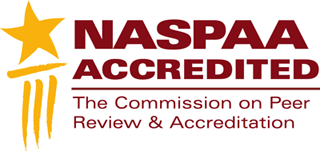Get Started on Your Graduate Degree Online Today!
The Department of Political Science and Public Administration offers the Master of Public Policy and Administration (MPPA) degree in an entirely online format. Students admitted to the Online MPPA program will complete the entire program online. The Online MPPA program modality delivers courses in a synchronous format, meaning that while courses are online/virtual they are conducted at the same time each week via WebEx, Zoom, or other similar video conferencing platforms.
Students admitted to the Online MPPA program are not permitted to switch between the online and face-to-face program formats and must remain online students through the duration of their degree program.

Tuition & Fees
| Tuition per credit hour | $581.00 |
| Instructional Support Fee per credit hour | $25.00 |
Tuition and fees listed are subject to change and do not include all possible charges. Additional fees may apply. Please refer to the master class schedule for individual course charges.
The MPPA degree program has a favorable faculty-to-student ratio that permits students to have close contact with faculty. The 6 member program faculty maintains a broad research agenda, and several faculty possess governmental service experience. We enroll approximately 35-50 students from all regions of Mississippi as well as from many other states. The MPPA program is accredited by the Network of Schools of Public Policy, Affairs, and Administration (NASPAA). As outlined in our mission, the Master of Public Policy and Administration program is committed to strengthening and expanding the professional workforce in state and local government in Mississippi and the region. The program prepares persons to serve effectively as public administrators at the national, state and local levels of government. Online MPPA classes typically meet Monday-Thursday evenings from 6-8:50 pm (CST)
After completing the NASPAA accredited MPPA program at Mississippi State University students will demonstrate competency in the following areas:
- To lead and manage in the public interest
- To participate in, and contribute to, the policy process
- To analyze, synthesize, think critically, solve problems and make evidence-informed decisions in a complex and dynamic environment
- To articulate, apply, and advance a public service perspective
- To communicate effectively and adapt to a dynamic workforce and society in a professional manner.









